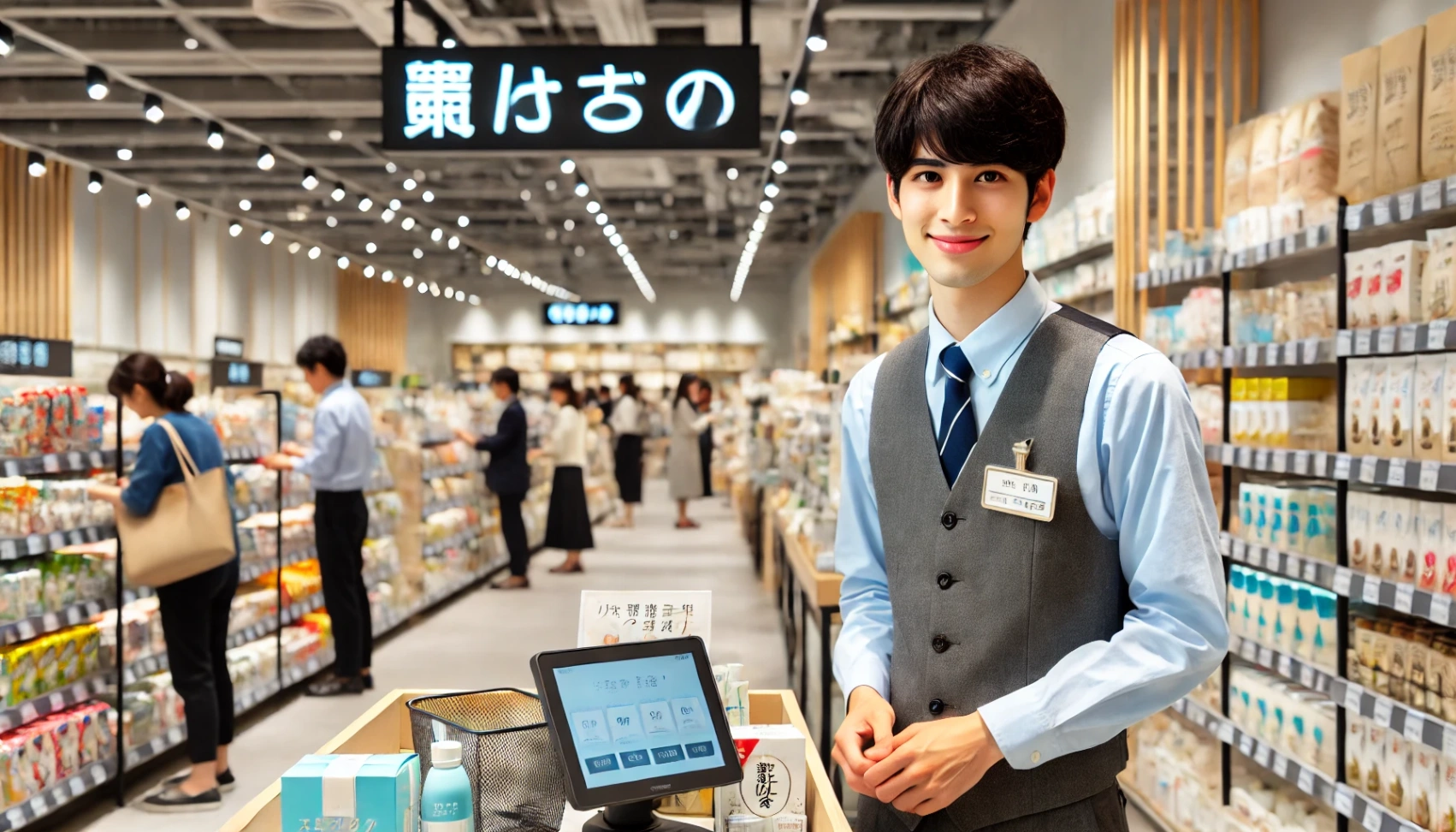Retail jobs are vital to Japan’s economy, and convenience stores, supermarkets, and department stores offer steady employment.
These jobs provide opportunities for locals, students, and foreign workers seeking experience or a reliable income.
This article covers job types, requirements, and how to start working in Japan’s retail sector.
Overview of the Retail Industry in Japan
Japan’s retail industry spans small shops to multinational chains, emphasizing customer service, efficiency, and hospitality.
Each store type plays a distinct role in the economy.
- Convenience Stores (Konbini) – 7-Eleven, FamilyMart, and Lawson dominate, offering food, essentials, and services.
- Department Stores – High-end retailers like Isetan, Takashimaya, and Mitsukoshi provide luxury goods, fashion, and gourmet food.
- Supermarkets – AEON, Seiyu, and Life provide groceries, fresh produce, and household goods.
- Specialty Shops – Stores like Uniqlo, Muji, and Don Quijote focus on fashion, home goods, and discounted products.
- Electronic Retailers – Chains like Yodobashi Camera and Bic Camera specialize in consumer electronics, home appliances, and gaming products.

Types of Retail Jobs Available
Retail jobs in Japan vary by role, but all require efficiency, customer service, and attention to detail.
Positions range from entry-level to management, offering opportunities for different skill levels. Here are some typical retail jobs available in Japan:
- Sales Associate – Assists customers, restocks shelves and maintains store organization.
- Cashier – Handles transactions, operates the register, and provides customer service.
- Store Manager – Oversees operations, manages staff, and meets sales targets.
- Stock Clerk – Manages inventory, organizes storage areas, and replenishes shelves.
- Customer Service Representative – Handles inquiries, returns, and resolves customer issues.
Requirements and Qualifications
Employers in Japan seek workers with language skills, legal eligibility, and cultural adaptability.
Some roles need minimal experience, but understanding expectations improves job prospects.
- Japanese Language Skills – Basic to intermediate proficiency (N4–N3 level) is often required, especially for customer-facing roles.
- Work Visa Eligibility – Foreign workers need a valid visa, such as a Student, Working Holiday, or Specified Skilled Worker visa.
- Customer Service Skills – Politeness, attentiveness, and the ability to assist customers efficiently.
- Punctuality and Reliability – Employers expect strict adherence to schedules and workplace discipline.
- Physical Stamina – Some roles involve long hours of standing, restocking, or lifting inventory.
How to Find a Retail Job in Japan
Job seekers can find opportunities through online platforms, networking, and direct applications.
Understanding where to look increases the chances of securing a position. Here are some common ways to find retail jobs:
- Job Search Websites – Platforms like GaijinPot, Hello Work, and Townwork list openings for locals and foreigners.
- Recruitment Agencies – Agencies help match job seekers with suitable employers.
- Networking and Referrals – Recommendations from friends, colleagues, or social groups can lead to job offers.
- In-Store Applications – Some stores accept direct applications, making in-person visits effective.
- University Job Boards – Students can check campus job listings for part-time opportunities.
Salary Overview
Salaries for retail positions vary based on role, experience, and location. Here’s an overview of typical salary ranges for common retail roles:
Sales Associate
- Average Annual Salary: Approximately ¥2,546,486
- Hourly Rate: Around ¥1,224
Cashier
- Average Annual Salary: Approximately ¥2,652,512
- Hourly Rate: Around ¥1,275
Store Manager
- Average Annual Salary: Typically ranges from ¥4,000,000 to ¥6,000,000, depending on store size and location
Stock Clerk
- Average Annual Salary: Approximately ¥2,546,486
- Hourly Rate: Around ¥1,224
Customer Service Representative
- Average Annual Salary: Typically ranges from ¥3,000,000 to ¥4,000,000, depending on the industry and experience

Employee Benefits
Employee benefits depend on the employer and job type, with full-time workers receiving more perks.
Most companies offer essential benefits to attract and retain employees. Here are the common benefits of retail jobs:
- Health Insurance – Covers medical expenses and check-ups under Japan’s national health system.
- Pension Contributions – Employees contribute to the National Pension or Employees’ Pension Insurance system.
- Transportation Allowance – Many employers reimburse commuting costs for public transportation.
- Paid Leave – Full-time employees receive annual paid vacation days, increasing with years of service.
- Bonuses – Some companies offer semi-annual bonuses based on performance and company profits.
- Employee Discounts – Retail workers often receive discounts on store products.
- Overtime Pay – Additional compensation for working beyond regular hours, following labor laws.
- Shift Flexibility – Many retail jobs offer flexible scheduling, especially for part-time workers.
Challenges and Work Environment
The roles come with a fast-paced work environment and high customer service expectations.
Employees must adapt to strict workplace standards and long hours. Here are some common challenges in the retail industry:
- Long Working Hours – Shift work, including nights, weekends, and holidays, is common.
- High Customer Service Standards – Employees must follow strict politeness, professionalism, and efficiency protocols.
- Physical Demands – Standing for long hours, restocking shelves, and handling deliveries can be exhausting.
- Strict Workplace Rules – Punctuality, dress codes, and adherence to company policies are strictly enforced.
- Limited Career Growth for Part-Timers – Advancement opportunities are mainly for full-time employees.
- Language Barriers – Foreign workers may struggle with customer interactions without Japanese proficiency.
Work Culture and Etiquette
Japan’s retail industry follows a structured work culture emphasizing professionalism, efficiency, and respect.
Employees are expected to follow workplace etiquette to maintain high service standards.
Here are key aspects of work culture and etiquette in retail jobs:
- Punctuality – Arriving on time is essential, and lateness is unacceptable.
- Politeness and Formality – Employees must use respectful language and bow when greeting customers.
- Uniform and Dress Code – Most retail jobs have strict dress codes, requiring clean and professional attire.
- Attention to Detail – Precision in stocking, organizing displays, and handling payments are expected.
- Hierarchy and Respect – Following seniority-based workplace hierarchy and respecting superiors is standard.
- Teamwork – Collaboration and clear communication with colleagues ensure smooth operations.
- Customer-First Mindset – Prioritizing customer needs, offering assistance proactively, and maintaining a positive attitude are required.
Legal Rights and Worker Protections
Japan has labor laws to protect retail workers’ rights and ensure fair wages, proper working conditions, and job security.
Employees should be aware of these protections to avoid workplace exploitation. Here are key legal rights and worker protections:
- Minimum Wage – Varies by region but ensures fair compensation for workers.
- Overtime Pay – Required for work beyond standard hours, typically at 125% of the regular wage.
- Paid Leave – Full-time employees earn paid vacation days, increasing with years of service.
- Social Insurance – Covers health, pension, and employment benefits for eligible workers.
- Rest Breaks – Employees must receive scheduled breaks during long shifts.
- Protection Against Unfair Dismissal – Employers cannot fire workers without cause or proper notice.
- Workplace Safety Regulations – Employers must provide a safe and healthy work environment.
- Anti-Discrimination Laws – Prohibit unfair treatment based on gender, nationality, or disability.
The Bottomline
Retail jobs in Japan offer stable employment, valuable experience, and opportunities for career growth.
Understanding job types, requirements, and workplace expectations can help job seekers succeed.
Start exploring available positions today and take the first step toward joining Japan’s retail workforce.











